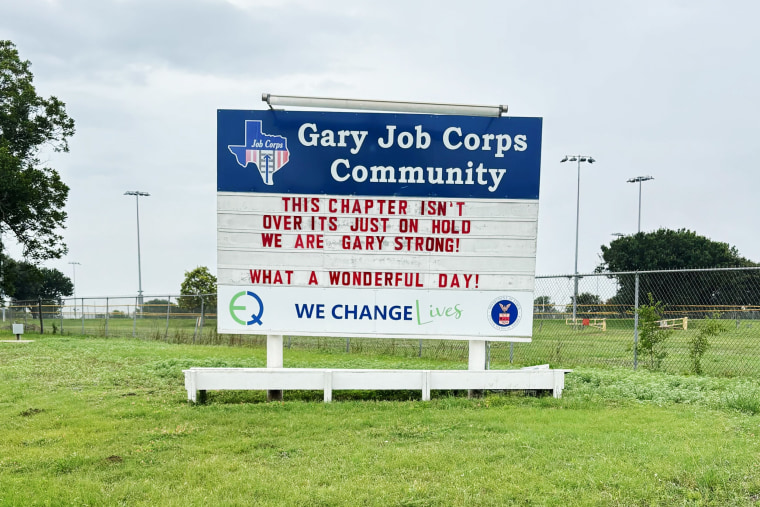Share this @internewscast.com
Mariyah Louis used to think she wouldn’t make it to 27 years old.
As a teenager, Louis navigated the foster care system before turning to Job Corps, a government-backed initiative offering free vocational training to low-income students. Today, she owns an auto detailing business, crediting her achievements to the opportunities provided by Job Corps.
“I managed to essentially rebuild my entire life, a chance that many foster youth seldom receive after experiencing such circumstances. I’ve been self-sufficient and taking care of myself since I was 17,” shared Louis, now 27 years old.
Recently, the Labor Department announced a suspension of Job Corps activities at 99 contract-run centers to take effect by the end of June, putting thousands of students in a state of uncertainty. As the program’s closure approaches, its alumni and staff are concerned and rushing to support students who have also depended on Job Corps for free housing and meals.
The closures are part of President Donald Trump’s sweeping attempt to reduce the federal workforce through mass layoffs, department closings and reorganizations. The efforts, some of which have been halted by federal judges, were framed as necessary to trim outsize government spending, but critics argued the cuts targeted vital sectors, jeopardizing Americans’ safety and health.
The National Job Corps Association and other groups joined to sue the Labor Department on Tuesday, urging the court to block the department from pausing Job Corps.
The cuts have alumni like Louis anxious about where the program’s current students will go next.
Louis was 17 when she entered the foster care system in Michigan, where she remained until she aged out at 18. She said that she did not have “a good relationship with school because of that transition into foster care,” but her interest in Job Corps piqued after a friend attended.
After Louis enrolled, she began working with a trade instructor who became a parental figure.
“I will never forget that man,” she said. “He was way beyond a trade instructor. For me, he was a mentor, like a real-life mentor.”
WJBK-TV of Detroit captured students carrying their belongings out of the center where Louis attended after the Labor Department announcement. Louis, who said she hasn’t slept in days, started a Facebook group for alumni, staff and students to share resources and launched a GoFundMe to support people affected by the program’s closure.
“I feel like they’re being robbed, and they’re not going to have that experience that I had and where I am today, because being honest with you, I didn’t think that I would make it to 27 years old. I did not, I can’t,” she said. “And I’m married and everything. I never would have saw this life for myself outside of foster care.”
In Astoria, Oregon, the Tongue Point Job Corps Center is still trying to find housing for more than two dozen students who were homeless before starting the program, according to Mac McGoldrick, the center’s director.
“There is a black cloud over this campus,” McGoldrick said. “It is a heartbreaking thing to see.”
Reached for comment, a spokesperson for the Labor Department said that a “comprehensive review of Job Corps revealed significant systemic issues — including an alarming number of serious incidents, poor student outcomes, and unsustainable costs.”
The spokesperson, Courtney Parella, said that only 38% of students graduate from the program. The National Job Corps Association pushed back on this statistic last week, saying that “graduate rates were depressed by Covid-19 policies” and claimed that Job Corps graduation rates have historically been above 60%. NBC News has not independently verified either statistic.
“Our priority is promoting success for every student and ensuring a safe transition during this pause,” Parella said. “We’ve instructed center operators to work directly with the providers who helped students enroll and made it clear that there is no fixed deadline for transfers.”
Randolph Goodman has worked at the Gary Job Corps Center in San Marcos, Texas, for more than 30 years after retiring from the Navy. He said that there have “been a lot of problems” with the program, that “sometimes it works, sometimes it doesn’t.”

“But, you know, that’s what we have to do,” he said. “There’s nobody else that does what we do. There’s no vocational school that does it, no college that does it, none of that stuff.”
Roughly 3 million students have participated in Job Corps since its 1964 launch, studying industries ranging from manufacturing to hospitality, according to the program’s archived website. The program targeted low-income students, providing them with access to free career training and education, housing, meals, basic medical care and a living allowance.
In fiscal year 2024, the Labor Department spent $1.7 billion on Job Corps out of the department’s $13.4 billion in discretionary funds, according to the department.

Levi Golden, who studies seamanship at Tongue Point Job Corps, said the program’s pause felt like a “gut punch.” He got his final certification last month and his high school diploma on Tuesday.
“If it weren’t for Job Corps, I would never have gotten my high school diploma. I wouldn’t have had the ability to get a good job,” said Golden, who has a job lined up for July. He plans to travel to Alaska, where he will be a crew member on a tug boat pushing material up the Yukon River for several months.
Golden, 24, enrolled in July 2023, and said Job Corps was “one of the best programs” he had experienced.
“Ever since I was a little boy, I had always dreamed of working on the water, but I never actually knew where to start or how to get there,” Golden said.
He said that he believed “more than anything in my heart that this is a necessary program, and I hate to see it shut down.”
vocates for the program have argued that Job Corps provides a way forward for teenagers who come from disadvantaged backgrounds.
“I believe this program was sent by God to help people who are less fortunate,” said Christopher Coupette, who graduated in 2016 from the Jobs Corps center in Pinellas County, Florida. “And it’s sickened me, and I’m just sad to hear that it’s being taken away.”
Coupette, 32, is now a wellness director at an assisted living facility and bemoaned that students would no longer be able to get free education in the program.
“It helps you get on your feet,” he said. “It doesn’t hold your hand throughout your whole life. It helps you get ahead of life.”
Coupette lived in multiple households growing up, moving to live with his father after his mother died, and later moving in with his sister after his father “was not there for me.”
“I was just not happy there,” he recalled. “I wanted something for myself or something. I don’t know what I wanted to do with my life.”
He decided to participate in Job Corps based on his sister’s experience in the program and “just fell completely in love with it.” Now, Coupette lives in the same city where he participated in the program. He is pursuing a degree in nursing, has a daughter and is preparing to get married in December.
“Everything started from Job Corps taking a bet on me and helping me climb the next ladder of life, so I’ll forever be a Job Corps student,” he said.











